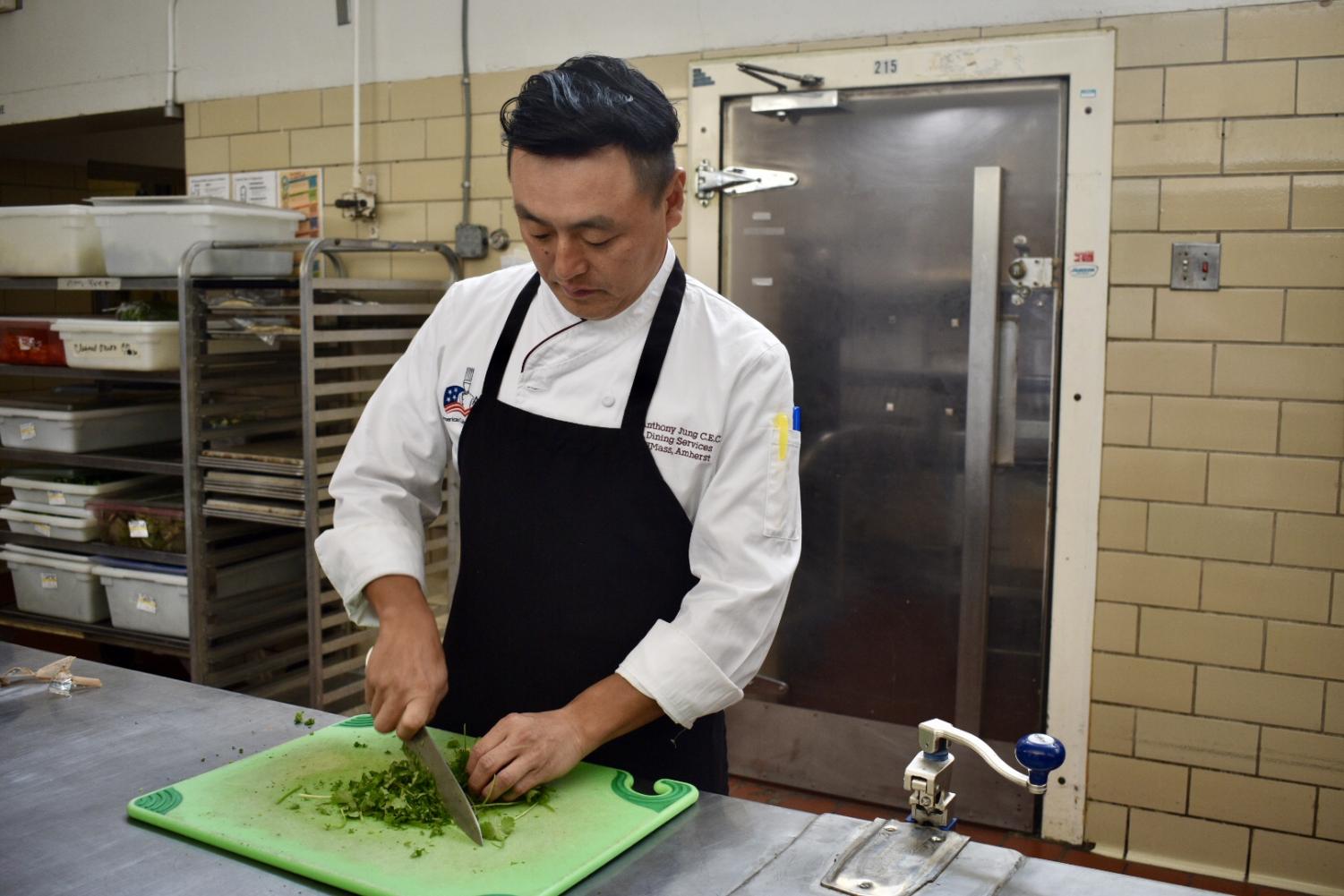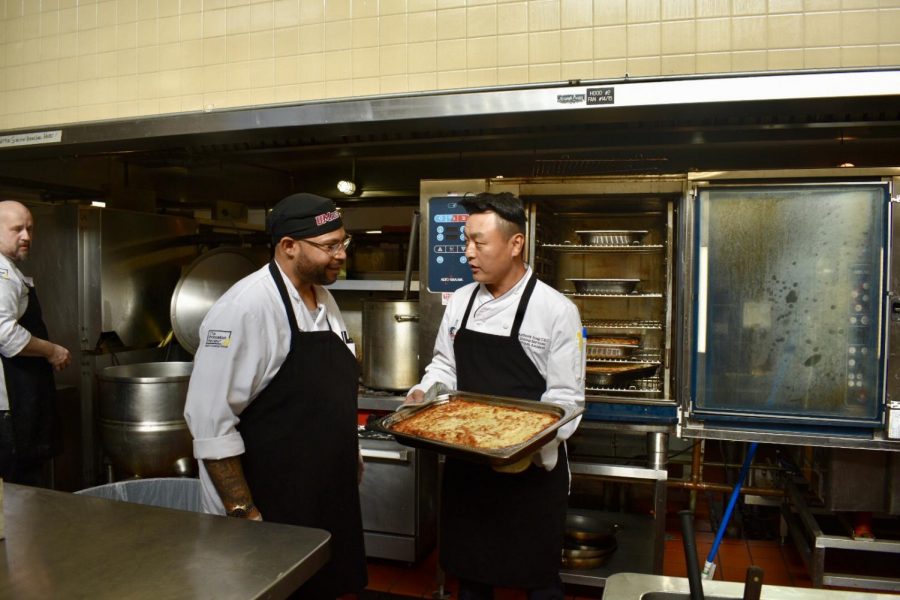Anthony Jung: Keeping UMass Dining No. 1
Find out what running the nation's top dining program is like.
February 6, 2019
Born in 1975 on Tongyeong, a small city on the coast of South Korea, Anthony Jung had a long way to go before he became a chef de cuisine at UMass Amherst.
In 1976, 13-month-old Jung and his family relocated to Chicopee, Massachusetts. A decade later, his parents decided to purchase Aqua Vitae, a popular Italian-style restaurant in Hadley famous for its pizza. By age 12, Jung was washing dishes, standing on the wooden box his father had built him so that he could reach the sink.
Throughout high school, he garnered more responsibilities at the restaurant, which served as his initial training in the culinary arts. After graduating in 1994, Jung came to UMass, where he studied political science but eventually dropped out in 1997, as he was unsure of what he wanted to do.
Jung worked at the now much-improved Berkshire until 2013, when he was transferred back to Hampshire. After experiencing its own renovation, Hampshire presented Jung with another challenge. His new workplace focused on serving local, sustainable cuisines from all around the world.After dropping out, Jung worked at a golf course before returning to UMass in 2000 to join the culinary staff at Hampshire Dining Commons. Having honed his craft during his time at Aqua Vitae, he quickly moved up the ranks to sous chef. In 2006, he was promoted to chef of the newly renovated Berkshire Dining Commons.
After only a year, Jung was promoted to chef de cuisine, and was made responsible for overseeing both the Worcester and Franklin Dining Commons. It was around this time when he re-enrolled at UMass, graduating with a degree in hospitality and tourism management in 2015.
The new position of chef de cuisine brings a lot of changes, one of them being that Jung spends far less time in the kitchen. One of his main duties is planning the meal schedule for the dining halls, which is just as daunting as it sounds.
While his new position comes with many responsibilities, Jung enjoys the work and is very good at what he does. UMass Amherst was found to have the best campus food in the nation for the third straight year by The Princeton Review.
“Having the No. 1 distinction benefits the university as a whole,” Jung said.
A large part of what Jung does is managing the food in both the financial and quality arenas. With a food budget of about $20 million, Jung has room to experiment. He does a lot of recipe and menu writing, which dictates all of his costs so he must balance it with the budget. Another part of his job, as Jung says, is “doing whatever Garett wants me to do.”
Garett DiStefano, the director of residential dining at UMass, is Jung’s boss, and he had nothing but positive things to say when asked about Anthony.
“He’s a great asset of ours. He’s a great example of persistence in how he sets goals for himself and achieves them,” DiStefano said. “He’s not afraid to challenge himself. He’s constantly learning different things and he has fun doing it.”
A smaller yet important part of Jung’s job entails doing VIP events, training staff, and testing recipes. Every winter and summer, Jung does recipe testing in an effort to keep introducing new dishes.
“We pick certain influential recipes, take these heirloom recipes, and branch off of those,” Jung said. He highlighted the importance of cost and sustainability when writing recipes, but reinforced the underlying goal: it has to taste good.
Jung also commended Ken Toong, the executive director of auxiliary enterprises at UMass. The chef talked about how UMass was drawing close to using an outside company to supply its food when Toong came in the 1990s and changed everything. At the time UMass served, as Jung put it, “comfort food done poorly.” Toong revolutionized the dining program and led UMass into the top rankings, eventually achieving No. 1 status.
Jung follows Toong’s example in his interactions with the Worcester and Franklin employees. He likes leading both dining halls’ teams to change and elevate their mindset.
“He’s really good at working with staff,” said Timothy Woods, the manager of Worcester Dining Commons.
Under Jung’s leadership, the percentage of people who eat at the dining halls changed from roughly 66 percent eating at Berkshire and Hampshire, to 50 percent eating at Berkshire and Hampshire and 50 percent eating at Franklin and Worcester. “It’s really cool to work out a concept and then see the staff execute it,” Jung said.
Jung also talked about how UMass Dining now gets their french fries. Amazingly enough, the potatoes that are turned into one of the most popular foods at UMass are grown right in Hatfield at Swaz Potato Farms, owned by the Szawlowski family. “This helped sustainability and lowered food costs,” Jung said. UMass Dining also gets many other foods locally when possible, and supports local farms in the process.
When asked about his most formidable task, Jung said it is the human element of the job. “The food is the easiest part,” he said. There are 300 full-time cooks on campus, and Jung is understandably tried by that staggering number. But he has risen to the challenge spectacularly, and it hasn’t gone unnoticed.
“Chef Jung has been instrumental on a lot of initiatives that we’ve done,” DiStefano said. “His ability to challenge different norms is a great trait that he has … he cares a lot about the students, the community, and the food.”
One way Jung gets involved with the students and the community is through the sushi-making event/Japanese cultural night. Back in March, the Yuri Kochiyama Cultural Center put on an event called “Cultural Appropriation vs. Cultural Appreciation.” In addition to discussing this subject, the twenty or so students present were taught how to properly make traditional nigiri and maki sushi.
As for his upcoming goals, Chef Jung hopes to keep UMass as the No. 1 dining program in the country. He doesn’t underestimate the importance of good food, and how it can positively affect a community.
Email Dan at dsmith@umass.edu.

